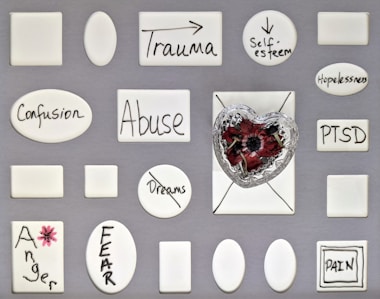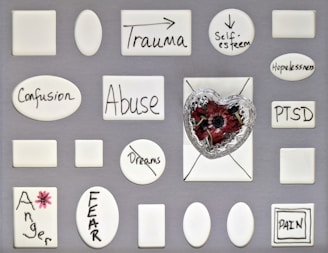

Important note
This material is provided to save marriages where conflict is primarily due to misunderstanding and lack of awareness about Attention-Deficit/Hyperactivity Disorder (ADHD). ADHD is a neuro-developmental disorder that impacts both men and women.
ADHD can inadvertently undermine a marriage through its core symptoms, impacting communication, consistency, and emotional regulation. The impulsivity and inattention characteristic of ADHD can lead to misunderstandings and feelings of neglect or frustration for the non-ADHD partner. Organizational challenges and forgetfulness in daily life can create a perception of unreliability or lack of involvement. Emotional dysregulation associated with ADHD may result in unpredictable mood swings, adding strain to marital interactions. These factors, without proper understanding and management, can erode the foundations of trust and partnership, leading to increasing conflict and dissatisfaction within the marriage.
However, in certain instances, ADHD may lead to the manifestation of serious misbehaviour. Notably, Moore et al. (2016) observed that in a New South Wales prison sample, 35% screened positive for adult ADHD, with 17% fulfilling the full diagnostic criteria. This prevalence notably surpasses the national average of approximately 4.2%. Factors such as emotional dysregulation, combined with ADHD's core symptoms of hyperactivity, impulsivity, and inattention, have been identified as contributing elements to interpersonal violence (IPV) among adults. This correlation highlights the complex impact of ADHD on behavior, as evidenced by the findings of de Graaf et al. (2008) and Buitelaar et al. (2014, 2015).
It is crucial to underscore that not all individuals with ADHD engage in abusive behavior. While ADHD may be a risk factor, it does not inevitably lead to abusive actions. In fact, numerous individuals with ADHD actively strive to offset their challenges, often going above and beyond to accommodate and please others. Recognizing the varied ways ADHD can manifest is key to devising effective interventions and support systems. These should aim to assist not just those with the disorder but also their partners, fostering understanding and healthy relationship dynamics.
ADHD Abusers
Men, women and children diagnosed with ADHD co-occurring with Oppositional Defiant Disorder (ODD), Conduct Disorder (CD), or Antisocial Personality Disorder (ASPD) demonstrate an increased likelihood of engaging in abuse. This heightened risk is attributed to the multifaceted ways in which these disorders influence interpersonal dynamics, potentially leading to more complex and challenging relationship environments.
1. Impulsivity and Aggression (ADHD and ODD): Core symptoms of ADHD and ODD include impulsivity and, in the case of ODD, often aggression. These traits can lead children to exhibit uncontrolled outbursts and difficulty managing anger, which may escalate into abusive behavior.
2. Difficulty with Emotional Regulation (ADHD and ODD): Both ADHD and ODD involve challenges in regulating emotions. Individuals may struggle to handle stress, frustration, or anger in healthy ways, potentially resulting in aggressive or abusive actions towards a partner.
3. Antisocial Behaviors (CD and ASPD): CD and ASPD are characterized by a pattern of antisocial behavior. This includes a disregard for the rights and feelings of others, which can manifest as abusive behavior in relationships. Individuals with these disorders may engage in manipulation, deceit, or direct aggression. Up to 70% of children in NSW juvenile detention meet the diagnostic criteria for CD, and are at risk of developing ASPD in adulthood.
4. Lack of Empathy (ASPD): A hallmark of ASPD is a lack of empathy, which can lead to abusive behavior in some adults. Without understanding or valuing their partner’s feelings, individuals with ASPD may not recognize or care about the harm they cause.
5. Co-occurring Conditions and Substance Abuse: Individuals with these disorders often have co-occurring mental health issues, including substance abuse, which can exacerbate tendencies towards violence and abuse.
6. History of Exposure to Violence (CD and ASPD): Individuals with CD or ASPD often have histories of exposure to violence or abuse, either as victims or witnesses. ADHD, known for its high heritability, often suggests that one parent may also exhibit symptoms of the condition, potentially leading to impulsive displays of anger. When such reactions are directed at similarly affected children, it can inadvertently exacerbate a child’s inappropriate behavior, underscoring the intricate interplay between genetic predisposition (nature) and environmental influences (nurture) in households impacted by ADHD. This background can normalize abusive behavior in current and future relationships.
7. Challenges in Stable Relationship Dynamics (ADHD, CD, ASPD): Difficulties in maintaining stable, healthy relationships are common in these disorders, leading to dysfunctional relationship dynamics that can include abusive patterns.
Case Study: The Intersection of ADHD, Familial Patterns, and Marital Strain
Background: Brian, who has untreated ADHD, grew up in an environment marked by significant verbal and emotional abuse. These formative experiences, combined with his ADHD, have significantly influenced his adult behavior and relationships.
Marital Challenges: Shortly after marrying Nancy, she began to notice Brian's volatile temper. Within two weeks of their marriage, Nancy expressed to her doctor feelings of terror due to Brian's unpredictable outbursts. Over the decades, Brian's anger episodes often coincided with alcohol consumption, exacerbating the situation. During this period, Brian engaged in an extramarital affair and blamed Nancy for his life's dissatisfaction, even considering divorce at one point before deciding against it.
Ongoing Tension and Health Impact: Despite not being physically abusive, Brian's continuous anger issues created a perpetual state of tension in their marriage. Nancy lived in a constant state of apprehension, which took a toll on her health. She suffered a heart attack, which she attributed to the ongoing stress caused by Brian's behavior.
Resolution: Years later, Brian's involvement in another affair led Nancy to ask him to leave, signifying the culmination of years of marital strain influenced by Brian's untreated ADHD and the behavioral patterns he developed in response to his childhood environment.
This case study highlights the complex interplay between untreated ADHD, learned behaviors from a challenging childhood, and their long-term effects on marital relationships. Brian's story illustrates how untreated mental health issues and unresolved childhood trauma can have cascading effects on an individual's personal and relational well-being.
ADHD Victims
A person with ADHD being twice as likely to be subject to interpersonal violence (IPV) and psycho-emotional violence (PEV) can be attributed to several factors related to the nature of ADHD and its impact on relationships and social interactions:
1. Vulnerability in Relationships: Individuals with ADHD may have difficulties with social cues and boundaries, potentially leading to relationships where they are more vulnerable to abuse. Their challenges with impulsivity, attention, and emotional regulation can make them susceptible targets for IPV and PEV.
2. Communication and Conflict Resolution Challenges: ADHD can affect communication skills, making it challenging to navigate conflicts effectively. Misunderstandings or poor conflict resolution skills can escalate tensions, increasing the risk of becoming victims of IPV and PEV.
3. Co-occurring Mental Health Issues: ADHD often co-occurs with other mental health disorders like anxiety, depression, or substance abuse, which can compound the difficulties in managing personal relationships and increase the risk of being involved in abusive situations.
4. Impaired Social Judgment: Individuals with ADHD may struggle with social judgment, making it more challenging to recognize early warning signs of abusive behavior in partners or others.
5. Impact of ADHD on Partners: The strain of ADHD symptoms on a relationship can lead to increased frustration or stress for partners, who may, in turn, exhibit abusive behaviors as a maladaptive way of coping with these challenges.
6. Stigmatization and Misunderstanding: Stigmatization and lack of understanding about ADHD can lead to negative attitudes or behaviors towards individuals with ADHD, making them more vulnerable to emotional abuse and manipulation.
It's important to emphasize that while these factors can contribute to an increased risk of experiencing IPV and PEV, they do not imply that all individuals with ADHD will face such circumstances. Understanding these risks highlights the need for supportive strategies, education, and resources for both individuals with ADHD and their families or partners.
Case Study: The Impact of Untreated ADHD on Employment and Personal Life
Background: Bob, has undiagnosed ADHD, and faces significant challenges in maintaining stable employment. His condition markedly impairs his ability to concentrate and maintain attention, particularly over extended periods. Characteristic impulsivity and hyperactivity further exacerbate his struggle to comply with standard workplace norms and protocols. Additionally, organizational deficits and poor time management, symptomatic of his ADHD, frequently result in missed deadlines and inconsistent job performance. These issues, in tandem with interpersonal communication and conflict resolution difficulties, have led to job dissatisfaction, strained relationships with supervisors, and a pattern of frequent job changes, interspersed with periods of unemployment.
Personal Life: Bob's spouse, lacking awareness of ADHD and its profound impacts, consulted a psychologist, who is a close family friend, for advice. She relayed to Bob that the psychologist considered divorce a viable option, suggesting that if Bob's behavior did not improve within a year, she might leave with their children.
Outcome: After a year, Bob's wife acknowledged improvements in his behavior but imposed a further twelve-month probationary period. This additional pressure, coupled with the ongoing strain of managing ADHD and employment challenges, led to Bob developing Post-Traumatic Stress Disorder (PTSD). He became emotionally withdrawn from his wife and children and ultimately decided to seek a divorce, highlighting the complex interplay between untreated ADHD, employment instability, and personal relationship dynamics.
This case study underscores how individuals with untreated ADHD can become victims of unintentional psycho-emotional violence (PEV). Bob's struggle with ADHD symptoms not only affects his employment stability but also impacts his personal relationships. The lack of understanding from his spouse about ADHD's challenges leads to unrealistic expectations and pressure. The psychological strain from these compounded pressures and the ultimatum of a probationary period exacerbate Bob's mental health, culminating in PTSD. The case highlights the vulnerability of individuals with ADHD to PEV in personal relationships, particularly when there is a lack of awareness and support regarding their condition.
Emotional disregulation
The elephant in the room
Public awareness is limited regarding the impact of unregulated emotions, particularly those linked to Attention Deficit Hyperactivity Disorder (ADHD) and related behavioral issues like Conduct Disorder, on domestic, family, and elder abuse. This gap in knowledge is a major obstacle in addressing and preventing abuse.
It is recognized that the inability to regulate emotions may stem from a treatable genetic condition affecting roughly 5% of the global population. Despite this, less than a quarter of those affected have been diagnosed and received assistance (1).
Individuals with this condition typically respond to emotional stress in one of two fundamental ways. Those who internalize their emotions might battle with depression and a diminished sense of self-worth. Conversely, when emotions are externalized, the pain may manifest as anger directed towards others or the situation causing the distress (2). In most cases, the impact of this condition on violent behavior is moderate and can be managed effectively.
However, this genetic disorder can co-occur with other mental health issues, such as Oppositional Defiant Disorder (ODD). Approximately 40% of those with the genetic disorder may develop ODD, and if their conduct issues extend from childhood into adulthood, they are more prone to deceit, verbal aggression, and violence towards partners or others close to them (3). Data suggests that about one in three individuals with ODD may escalate into a more serious condition such as Conduct Disorder involving aggression and legal challenges (4).
Deficits in Emotional Regulation in Youth with ADHD
Assessing Adults With ADHD and Comorbidities
Deficient Emotional Self-Regulation in Children with ADHDResearch Review: A new perspective on ADHD: emotion dysregulation and trait models
https://www.additudemag.com
Emotional dysregulation and Attention-Deficit/Hyperactivity Disorder
Psychiatric Comorbidity, Family Dysfunction ... in Youth With ODDhttps://www.adultadhd.org.au
https://www.betterhealth.vic.gov.au
https://www.additudemag.com
http://www.ptscoaching.com


ADHD intense feelings
Thomas Brown, Ph.D., explains why (and how) ADHD sparks such intense anger, frustration, and hurt.
“Challenges with processing emotions start in the brain itself. Sometimes the working memory impairments of ADHD allow a momentary emotion to become too strong, flooding the brain with one intense emotion.”
1) Emotions Rule
Few doctors factor in emotional challenges when making an ADHD diagnosis. In fact, current diagnostic criteria for ADHD include no mention of "problems with emotions." Yet recent research reveals that those with ADHD have significantly more difficulty with low frustration tolerance, impatience, hot temper, and excitability than a control group.
2) Processing Emotion: A Brain Thing
Challenges with emotions start in the brain itself. Sometimes the working memory 1mpairments of ADHD allow a momentary emotion to become too strong, flooding the brain with one intense emotion. At other times, the person with ADHD seems insensitive or unaware of the emotions of others. Brain connectivity networks carrying information related to emotion seem to be somewhat more limited in individuals with ADHD.
3) Fastening on a Feeling
When an adolescent with ADHD becomes enraged when a parent refuses him use of the car, for example, his extreme response may be due to "flooding" — a momentary emotion that can gobble up all of the space in his head just like a computer virus can gobble up all of the space on a hard drive. This focus on one emotion crowds out other important information that might help him modulate his anger and regulate his behavior.
4) Extreme Sensitivity to Disapproval
Individuals with ADHD often become quickly immersed in one salient emotion and have problems shifting their focus to other aspects of a situation. Hearing a slight uncertainty in a coworker's reaction to a suggestion may lead to interpreting this as criticism and an outburst of inappropriate self-defense without having listened carefully to the coworker's response.
5) Bottled Up by Fear
Significant social anxiety is a chronic difficulty experienced by more than one third of teens and adults with ADHD. They live almost constantly with exaggerated fears of being seen by others as incompetent, unappealing, or uncool.
6) Giving In to Avoidance and Denial
Some people with ADHD don't suffer from a lack of awareness of important emotions but from an inability to tolerate those emotions enough to deal effectively with them. They become caught up in behavior patterns to avoid painful emotions that seem too overwhelming — looming deadlines or meeting an unfamiliar group of people.
7) Carried Away with Emotion
For many people with ADHD, the brain's gating mechanism for regulating emotion does not distinguish between dangerous threats and more minor problems. These individuals are often thrown into panic mode by thoughts or perceptions that do not warrant such a reaction. As a result, the ADHD brain can't deal more rationally and realistically with events that are stressful.
8) Sadness and Low Self-Esteem
People with untreated ADHD can suffer from dysthymia — a mild but long-term mood disorder or sadness. It is often brought on by living with the frustrations, failures, negative feedback, and stresses of life due to untreated or inadequately treated ADHD. People who are dysthymic suffer almost every day from low energy and self-esteem.
9) Emotions and Getting Started
Emotions motivate action — action to engage or action to avoid. Many people with untreated ADHD can readily mobilize interest only for activities offering very immediate gratification. They tend to have severe difficulty in activating and sustaining effort for tasks that offer rewards over the longer term.
10) Emotions and Getting Started 2
Brain imaging studies demonstrate that chemicals that activate reward-recognizing circuits in the brain tend to bind on significantly fewer receptor sites in people with ADHD than do those in a comparison group. People with ADHD are less able to anticipate pleasure or register satisfaction with tasks for which the payoff is delayed.
11) Emotions and Working Memory
Working memory brings into play, consciously and/or unconsciously, the emotional energy needed to help us organize, sustain focus, monitor and self-regulate. Many individuals with ADHD, though, have inadequate working memory, which may explain why they are often disorganized, lose their temper, or procrastinate.
12) Emotions and Working Memory 2
Sometimes the working memory impairments of ADHD allow a momentary emotion to become too strong. At other times, working memory impairments leave the person with insufficient sensitivity to the importance of a particular emotion because he or she hasn't kept other relevant information in mind.
13) Treating Emotional Challenges
Treating the emotional challenges of ADHD requires a multimodal approach: It starts with a careful and accurate evaluation for ADHD, one that explains ADHD and its effect on emotions. ADHD medication may improve the emotional networks in the brain. Talk therapy can help a person manage fear or low self-esteem. Coaching may help a person overcome problems with getting boring tasks completed.
Thomas E. Brown, Ph.D., is a Yale-trained clinical psychologist who specializes in assessment and treatment of ADHD and related problems in children, adolescents, and adults. After serving on the clinical faculty of Yale Medical School for 25 years he has relocated to Manhattan Beach, California, to open his new Brown Clinic for Attention and Related Disorders. He is also an adjunct clinical associate professor of psychiatry and behavioral sciences at the Keck School of Medicine of the University of Southern California.
Dr. Brown has published 30 peer-reviewed scientific journal articles and five books on ADHD. His Smart but Stuck: Emotions in Teens and Adults with ADHD was published in 2014. His newest book, Outside the Box: Rethinking ADD/ADHD in Children and Adults: A Practical Guide, was released this month. You can reach him at: BrownADHDclinic.com.




Some withdraw while others explode
Rejection sensitive dysphoria
Rejection Sensitive Dysphoria (RSD) occurs when intense emotional distress is triggered by perceived failure or rejection. This condition is commonly associated with ADHD and is thought to arise from variations in brain structure, as suggested by experts in the field.
Coping with ADHD characterized by sensitive dysphoria in a relationship requires a multifaceted approach focused on understanding, communication, and support:
1. Education and Awareness: Both partners should educate themselves about ADHD and sensitive dysphoria. Understanding how ADHD affects emotions and behavior is crucial for empathy and effective communication.
2. Open Communication: Establish a habit of open and honest communication. The non-ADHD partner should express their feelings and concerns without judgment, while the ADHD partner should articulate their experiences and triggers for dysphoria.
3. Develop Coping Strategies: Together, identify and develop coping strategies for when sensitive dysphoria occurs. This might include taking a break during heated moments, using calming techniques, or having a predefined plan to manage intense emotions.
4. Professional Support: Consider seeking guidance from a mental health professional. Therapy, either individual or couples, can provide tools and strategies for managing ADHD and sensitive dysphoria, and improve relationship dynamics.
5. Build a Support Network: Having a supportive network, including friends, family, or support groups, can provide additional understanding and resources.
6. Practice Patience and Compassion: The non-ADHD partner should practice patience and compassion, recognizing that sensitive dysphoria is a symptom of ADHD and not a deliberate action. Similarly, the ADHD partner should acknowledge their partner's efforts and feelings.
7. Focus on Strengths: Emphasize and leverage the strengths in the relationship. Celebrate successes and progress in managing ADHD and its impacts.
By combining understanding, communication, and strategic coping mechanisms, couples can navigate the challenges of ADHD and sensitive dysphoria more effectively, fostering a supportive and resilient relationship.
An abusive partner might exploit Rejection Sensitive Dysphoria (RSD) in their partner as a tool to discredit and manipulate perceptions, particularly in the context of allegations of abuse. They could use several tactics:
1. Undermining Credibility: The abusive partner might suggest that the partner's RSD leads to overreacting or misinterpreting situations. By framing their partner's emotional responses as exaggerations due to RSD, they can undermine their credibility and cast doubt on their allegations.
2. Highlighting Emotional Sensitivity: They may emphasize their partner's heightened sensitivity to rejection or criticism, implying that the partner's allegations are just extreme emotional reactions rather than responses to actual abuse.
3. Portraying Themselves as a Victim: The abuser might position themselves as a victim of their partner's purportedly irrational behavior caused by RSD, shifting the focus away from their abusive actions.
4. Gaslighting: This involves manipulating the partner into questioning their own feelings and perceptions. By attributing the partner's legitimate concerns about abuse to their RSD, the abuser can make them doubt the validity of their own experiences.
5. Using Medical Opinions as a Weapon: The abuser might leverage medical opinions or literature about RSD to convince others that the partner's allegations are merely symptoms of their condition and not grounded in reality.
6. Isolating the Partner: By convincing friends, family, or authorities that the partner's claims are exaggerated due to RSD, the abuser can isolate them, making it harder for the partner to seek help or find support.
It's crucial for friends, family, and professionals involved in such cases to be aware of these manipulative tactics and to approach such situations with a nuanced understanding of both RSD and the dynamics of abuse. Proper support and validation are essential for individuals with RSD who may be in abusive relationships.
Exploiting RSD to isolate a partner


Assessing Adults With ADHD and Comorbidities
Approximately 4.4% of US adults have attention-deficit/hyperactivity disorder (ADHD). Yet, this condition re-mains underdiagnosed as only 10.9% of adults with ADHD receive treatment. To complicate diagnosis, adults with ADHD often have comorbid psychiatric disorders, which may mask the symptoms of ADHD.
Link to PDF
Emotional dysregulation and Attention-Deficit/Hyperactivity Disorder
First, emotion dysregulation is prevalent in ADHD throughout the lifespan and is a major contributor to impairment. Second, emotion dysregulation in ADHD may arise from deficits in orienting towards, recognizing and/or allocating attention to emotional stimuli; these deficits that implicate dysfunction within a striato-amygdalo-medial prefrontal cortical network. Third, while current treatments for ADHD often also ameliorate emotion dysregulation, a focus on this combination of symptoms reframes clinical questions and could stimulate novel therapeutic approaches.
Link to PDF
Severity of the Aggression/Anxiety-Depression/Attention (A-A-A) CBCL Profile Discriminates between Different Levels of Deficits in Emotional Regulation in Youth with ADHD
Recent research has begun to recognize that child patients with ADHD manifest deficient
emotional self-regulation (DESR). DESR is characterized by poor self-regulation including
such symptoms as low frustration tolerance, impatience, quickness to anger, and being easily excited to emotional reactions. This study showed that 36% of children with ADHD had a positive CBCL-DESR profile and concludes that Severity scores of the A-A-A CBCL profiles can help distinguish two groups of emotional regulation problems in children with ADHD.
Link to PDF
Oppositional Defiant Disorder Is Better Conceptualized as
a Disorder of Emotional Regulation
The regulation of emotions can be defined as the process by which individuals influence which emotions they have, when they have them, and how they experience and express them. Dysregulation can be defined as the lack of temper control, affective lability, and emotional overreaction. Deficient regulation of emotions is a pervasive and impairing component of many psychiatric disorders seen in childhood, presenting in uni-polar and bipolar mood disorders, anxiety disorders, and behavior disorders including ADHD and Oppositional Defiant Disorder (ODD).
Link to PDF
Young adult outcome of attention deficit hyperactivity disorder:
a controlled 10-year follow-up study
By their young adult years, ADHD youth were at high risk for a wide range of adverse
psychiatric outcomes including markedly elevated rates of antisocial, addictive, mood and anxiety disorders. These prospective findings provide further evidence for the high morbidity associated with ADHD across the life-cycle and stress the importance of early recognition of this disorder for prevention and intervention strategies.
Link to PDF
Conduct disorder
Conduct disorder (CD) refers to a set of problem behaviours exhibited by children and adolescents, which may involve the violation of a person, their rights or their property. It is characterised by aggression and, sometimes, law-breaking activities.
CD is one of a group of behavioural disorders known collectively as disruptive behaviour disorders, which include oppositional defiant disorder (ODD) and attention deficit hyperactivity disorder (ADHD). Early intervention and treatment is important, since children with untreated CD are at increased risk of developing a range of problems during their adult years including substance use, personality disorders and mental illnesses.
Link to web page
Selected research
Get in Touch
If you’d like to talk, ask a question, or learn about support: contact@hksgroup.org
For urgent help: 000 (emergency in Australia) 1800RESPECT – 1800 737 732
